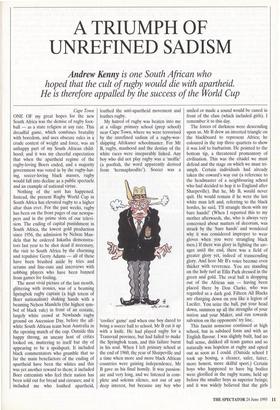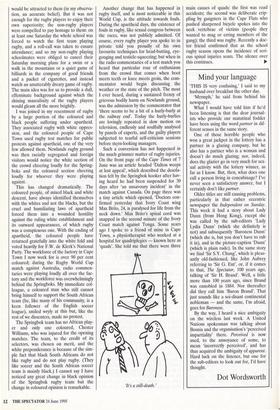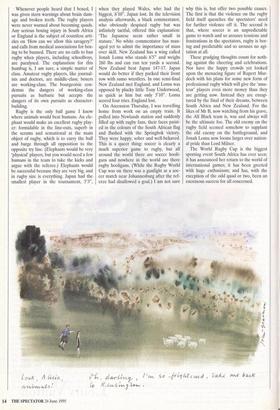A TRIUMPH OF UNREFINED SADISM
Andrew Kenny is one South African who
hoped that the cult of rugby would die with apartheid. He is therefore appalled by the success of the World Cup
Cape Town ONE OF my great hopes for the new South Africa was the demise of rugby foot- ball — as a state religion at any rate. This dreadful game, which combines brutality with boredom, and uses obscure rules in a crude contest of weight and force, was an ' unhappy part of my South African child- hood; and it was my cheerful expectation that when the apartheid regime of the rugby-loving Boers ended, and a majority government was voted in by the rugby-hat- ing, soccer-loving black masses, rugby would fall into decline as a public spectacle and an example of national virtue.
Nothing of the sort has happened. Instead, the present Rugby World Cup in South Africa has elevated rugby to a higher altar than ever. For the past weeks, rugby has been on the front pages of our newspa- pers and in the prime slots of our televi- sion. The ending of capital punishment in South Africa, the lowest gold production since 1956, the admission by Nelson Man- dela that he ordered Inkatha demonstra- tors last year to be shot dead if necessary, the visit to South Africa by the charming and repulsive Gerry Adams — all of these have been brushed aside by tries and scrums and line-outs and interviews with sobbing players who have been banned from games for fouling.
The most vivid picture of the last month, glittering with ironies, was of a beaming Springbok rugby captain (a high totem of Boer nationalism) shaking hands with a beaming Nelson Mandela (the highest sym- bol of black rule) in front of an ecstatic, largely white crowd at Newlands rugby ground on Ascension Day, before the all- white South African team beat Australia in the opening match of the cup. Outside this happy throng, an uneasy host of critics looked on, muttering to itself but shy of appearing to be a spoilsport. It included black commentators who grumble that so far the main benefactors of the ending of apartheid have been the whites and this was yet another reward to them; it included Boer extremists who feel their nation has been sold out for bread and circuses; and it included me who loathed apartheid, loathed the anti-apartheid movement and loathes rugby.
My hatred of rugby was beaten into me at a village primary school (prep school) near Cape Town, where we were terrorised by the unrefined sadism of a rugby-wor- shipping Afrikaner schoolmaster. For Mr B, rugby, manhood and the destiny of the white races were inseparably linked. Any boy who did not play rugby was a `moffie' (a pooftah, the word apparently derived from 'hermaphrodite). Soccer was a `coolies' game' arrd when one boy dared to bring a soccer ball to school, Mr B cut it up with a knife. He had played rugby for a Transvaal province, but had failed to make the Springbok team, and this failure burnt in his soul. When I left primary school at the end of 1960, the year of Sharpeville and a time when more and more black African • countries were gaining independence, Mr B gave us his final homily. It was passion- ate and very long, and we listened in com- plete and solemn silence, not out of any deep interest, but because any boy who smiled or made a sound would be caned in front of the class (which included girls). I remember it to this day.
The forces of darkness were descending upon us. Mr B drew an inverted triangle on the blackboard to represent Africa; he coloured in the top three quarters to show it was lost to barbarism. He pointed to the bottom tip, a threatened promontory of civilisation. This was the citadel we must defend and the stage on which we must tri- umph. Certain individuals had already taken the coward's way out (a reference to the headmaster of a neighbouring school who had decided to hop it to England after Sharpeville). But he, Mr B, would never quit. He would remain if he were the last white man left and, referring to the black hordes, he said, 'I'll strangle them with my bare hands!' (When I reported this to my mother afterwards, she, who is always very concerned about matters of decorum, was struck by the 'bare hands' and wondered why it was considered improper to wear gloves when you were strangling black men.) If there was glory in fighting the sav- ages until the end, there was a field of greater glory yet, indeed of transcending glory. And here Mr B's voice become even thicker with reverence. You are standing on the holy turf at Ellis Park dressed in the green and gold. The oval ball is dropping out of the African sun — having been placed there by Don Clarke, who was regarded as a dark god. Fifteen All Blacks are charging down on you like a legion of Lucifer. You seize the ball, put your head down, summon up all the strengths of your nation and your Maker, and run towards salvation on the opponents' try line.
This fascist nonsense continued at high school, but in subdued form and with an English flavour. I was slightly built, had no ball sense, disliked all team games and so naturally was hopeless at rugby and opted out as soon as I could. (Outside school I took up boxing, a cleaner, safer, fairer, more honest, more skilful sport.) Certain boys who happened to have big bodies were glorified in the rugby teams, held up before the smaller boys as superior beings; and it was widely believed that the girls would be attracted to them (in my observa- tion, an accurate belief). But it was not enough for the rugby players to enjoy their own superiority; the non-rugby players were compelled to pay homage to them: on at least one Saturday the whole school was forced to watch the first team playing rugby, and a roll-call was taken to ensure attendance; and so my non-rugby playing schoolmates were obliged to cancel their Saturday morning plans for a swim or a walk in the mountains or a quiet game of billiards in the company of good friends and a packet of cigarettes, and instead watch an unutterably dreary game of rugby. The main idea was for us to provide a dull, effeminate background against which the shining masculinity of the rugby players would gleam all the more brightly.
I was joined in my resentment of rugby by a large portion of the coloured and black people suffering under apartheid. They associated rugby with white oppres- sion, and the coloured people of Cape Town used rugby test matches for public protests against apartheid, one of the very few allowed them. Newlands rugby ground was then racially segregated and foreign visitors would notice the white section of the crowd cheering loudly for the Spring- boks and the coloured section cheering loudly for whoever they were playing against.
This has changed dramatically. The coloured people, of mixed black and white descent, have always identified themselves with the whites and not the blacks, but the cruel and humiliating laws of apartheid forced them into a wounded hostility against the ruling white establishment and its outward appearances, of which rugby was a conspicuous one. With the ending of apartheid, the coloured people have returned gratefully into the white fold and voted heavily for F.W. de Klerk's National Party. The workforce of the factory in Cape Town I now work for is over 90 per cent coloured; during the Rugby World Cup match against Australia, radio commen- taries were playing loudly all over the fac- tory and the workforce was overwhelmingly behind the Springboks. My immediate col- league, a coloured man who still cannot bring himself to support the South African team (he, like many of his community, is a keen follower of the English soccer league), smiled wryly at this but, like the rest of we dissenters, made no protest.
The Springbok team has no African play- er and only one coloured, Chester Williams, who was injured for the opening matches. The team, to the credit of its selectors, was chosen on merit, and the white preponderance is because of the sim- ple fact that black South Africans do not like rugby and do not play rugby. (They like soccer and the South African soccer team is mainly black.) I cannot say I have noticed any great change in black opinion of the Springbok rugby team but the change in coloured opinion is remarkable. Another change that has happened in rugby itself, and is most noticeable in this World Cup, is the attitude towards fouls. During the apartheid days, the existence of fouls in rugby, like sexual congress between the races, was not publicly admitted. Of course, every rugby player you spoke to in private told you proudly of his own favourite techniques for head-butting, eye- gouging and testicle-squeezing; but when in the radio commentaries of a test match you heard that particular roar of enthusiasm from the crowd that comes when boot meets teeth or knee meets groin, the com- mentator would begin discussing the weather or the state of the pitch. The most I ever heard, during a sustained frenzy of grievous bodily harm on Newlands ground, was the admission by the commentator that `there seems to be a bit of a hurly-burly at the railway end'. Today the hurly-burlies are lovingly repeated in slow motion on television, endlessly and soulfully analysed by panels of experts, and the guilty players subjected to tearful self-criticism sessions before stern-looking managers.
Such a conversion has not happened in the much grimmer matter of rugby injuries. On the front page of the Cape Times of 7 June was an article headed 'Dalton weeps at lost appeal', which described the desola- tion felt by the Springbok hooker after hav- ing heard he had been suspended for 30 days after 'an unsavoury incident' in the match against Canada. On page three was a tiny article which opened, 'Doctors con- firmed yesterday that Ivory Coast wing Max Brito, 24, is paralysed for life from the neck down.' Max Brito's spinal cord was snapped in the second minute of the Ivory Coast match against Tonga. Some years ago I spoke to a friend of mine in Cape Town, a physiotherapist who worked at a hospital for quadriplegics — known here as `quads'. She told me that there were three It's a still-death.' main causes of quads: the first was road accidents; the second was deliberate crip- pling by gangsters in the Cape Flats who pushed sharpened bicycle spokes into the neck vertebrae of victims (people they wanted to mug or erring members of the gang); the third was rugby. Recently a doc- tor friend confirmed that as the school rugby season opens the incidence of seri- ous spinal injuries soars. The silence over this continues. ► Whenever people heard that I boxed, I was given stern warnings about brain dam- age and broken teeth. The rugby players were never warned about becoming quads. Any serious boxing injury in South Africa or England is the subject of countless arti- cles on 'How can we allow this savagery?' and calls from medical associations for box- ing to be banned. There are no calls to ban rugby when players, including schoolboys, are paralysed. The explanation for this humbug is, I am sure, a simple matter of class. Amateur rugby players, like journal- ists and doctors, are middle-class; boxers are working-class. The bourgeoisie con- demns the dangers of working-class pursuits as barbaric but accepts the dangers of its own pursuits as character- building.
Rugby is the only ball game I know where animals would beat humans. An ele- phant would make an excellent rugby play- er: formidable in the line-outs, superb in the scrums and sensational at the main object of rugby, which is to carry the ball and barge through all opposition to the opposite try line. (Elephants would be very `physical' players, but you would need a few humans in the team to take the kicks and argue with the referee.) Elephants would be successful because they are very big, and in rugby size is everything. Japan had the smallest player in the tournament, 5'3", when they played Wales, who had the biggest, 6'10". Japan lost. In the television analysis afterwards, a black commentator, who obviously despised rugby but was infinitely tactful, offered this explanation: `The Japanese seem rather small in stature.' No white commentator has man- aged yet to admit the importance of mass over skill. New Zealand has a wing called Jonah Lomu who stands 6'5" and weighs 260 lbs and can run ten yards a second. New Zealand beat Japan 147-17. Japan would do better if they packed their front row with sumo wrestlers. In one semi-final New Zealand met England, and Lomu was opposed by plucky little Tony Underwood, as quick as him but only 5'10". Lomu scored four tries. England lost. On Ascension Thursday, I was travelling home from work on an empty train. It pulled into Newlands station and suddenly filled up with rugby fans, their faces paint- ed in the colours of the South African flag and flushed with the Springbok victory. They were happy, sober and well-behaved. This is a queer thing: soccer is clearly a much superior game to rugby, but all around the world there are soccer hooli- gans and nowhere in the world are there rugby hooligans. (While the Rugby World Cup was on there was a gunfight at a soc- cer match near Johannesburg after the ref- eree had disallowed a goal.) I am not sure why this is, but offer two possible causes. The first is that the violence on the rugby field itself quenches the spectators' need for further violence off it. The second is that, where soccer is an unpredictable game to watch and so arouses tensions and frustrations in the spectators, rugby is bor- ing and predictable and so arouses no agi- tation at all.
These grudging thoughts count for noth- ing against the cheering and celebrations. Nor have the happy crowds yet looked upon the menacing figure of Rupert Mur- doch with his plans for some new form of professional rugby which will give the 'ama- teur' players even more money than they are getting now. Instead they are enrap- tured by the final of their dreams, between South Africa and New Zealand. For the likes of Mr B, now watching from his grave, the All Black team is, was and always will be the ultimate foe. The old enemy on the rugby field seemed somehow to supplant the old enemy on the battleground, and Jonah Lomu now looms larger over nation- al pride than Lord Milner.
The World Rugby Cup is the biggest sporting event South Africa has ever seen; it has announced her return to the world of international games; it has been greeted with huge enthusiasm; and has, with the exception of the odd quad or two, been an enormous success for all concerned.




























































 Previous page
Previous page